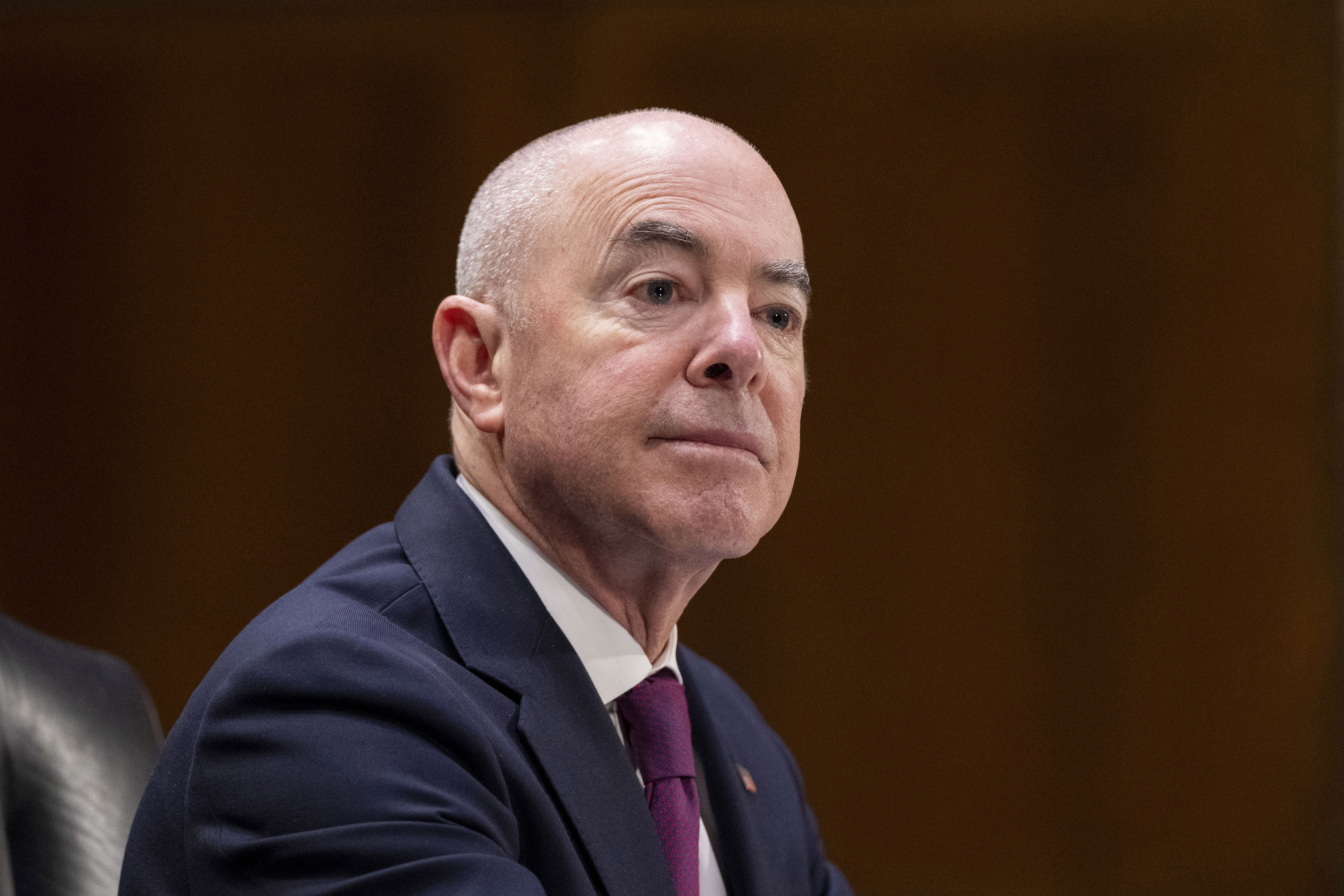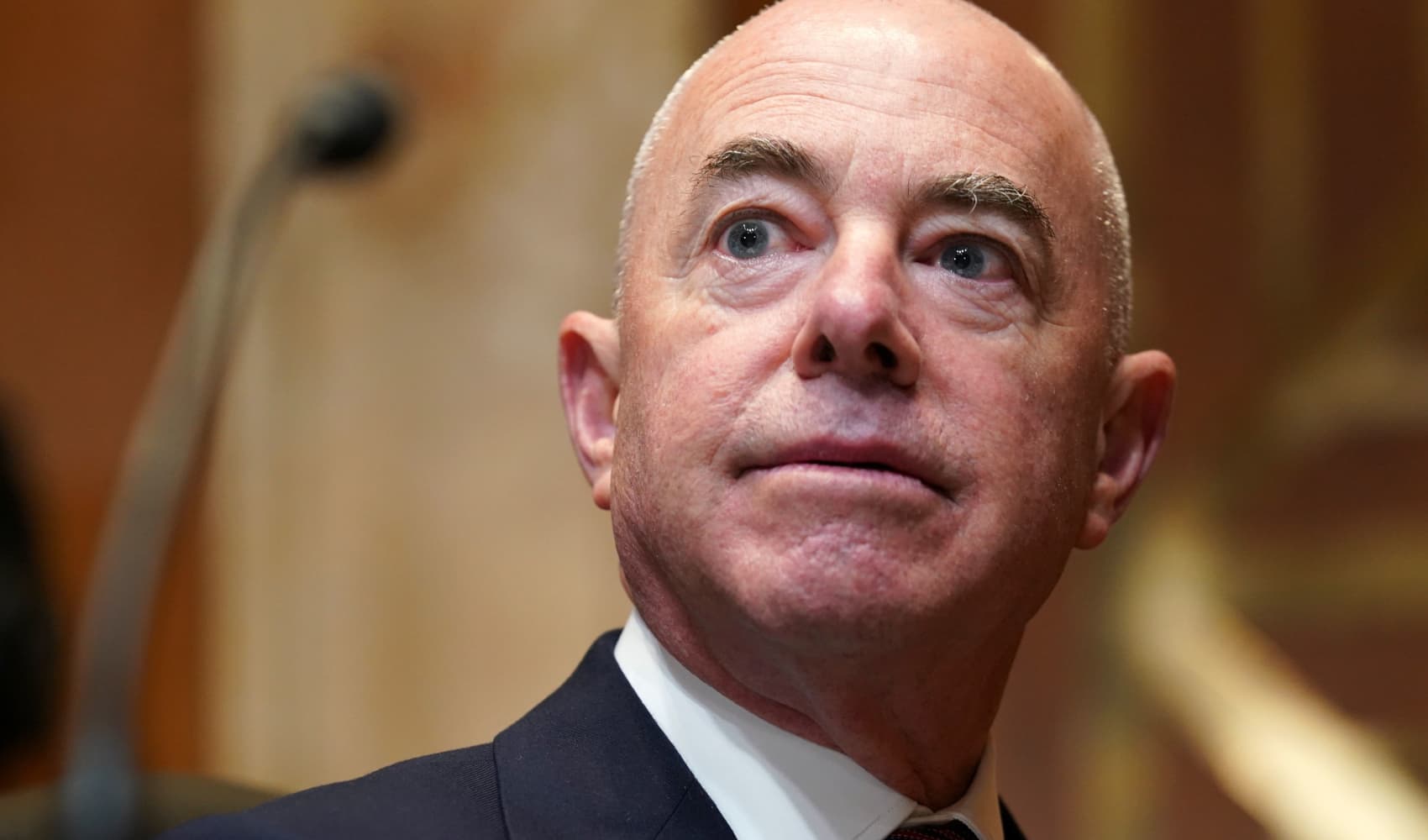
In a dramatic setback, House Republicans failed Tuesday to impeach Homeland Security Secretary Alejandro Mayorkas, forced to shelve a high-profile priority — for now — after a few GOP lawmakers refused to go along with the party’s plan.
The stunning roll call fell just a few votes short of impeaching Mayorkas, stalling the Republicans’ drive to punish the Biden administration over its handling of the U.S-Mexico border. With Democrats united against the charges, the Republicans needed almost every vote from their slim majority to approve the articles of impeachment.
In a dramatic, rowdy scene on the House floor, the vote was tied for several minutes, 215-215. Several Republican lawmakers — led by the impeachment's chief sponsor, Rep. Marjorie Taylor Greene of Georgia — surrounded one of the holdouts, Wisconsin Republican Mike Gallagher, who refused to change his vote. With the tally stuck, Democrats shouted for the gavel to close out the vote.
The House is likely to revisit plans to impeach Mayorkas, but next steps are highly uncertain. In the end three Republicans opposed the impeachment, and a fourth Republican switched his vote so the measure could be revisited. The final tally was 214-216.
Get top local stories in Southern California delivered to you every morning. Sign up for NBC LA's News Headlines newsletter.
“Frustrated,” said Rep. Mark Green, R-Tenn., the chairman of the Homeland Security Committee, "but we’ll see it back again.”
House Speaker Mike Johnson, who could lose only a few Republicans from his slim majority, said he personally spoke to the GOP holdouts acknowledging the “heavy, heavy” vote as he sought their support.
“It’s an extreme measure,” said Johnson, R-La.. “But extreme times call for extreme measures.”
Not since 1876 has a Cabinet secretary faced impeachment charges and it's the first time a sitting secretary is being impeached — 148 years ago, Secretary of War William Belknap resigned just before the vote.
The impeachment charges against Mayorkas come as border security is fast becoming a top political issue in the 2024 election, a particularly potent line of attack being leveled at President Joe Biden by Republicans, led by the party's front-runner for the presidential nomination, Donald Trump.
Record numbers of people have been arriving at the southern border, many fleeing countries around the world, in what Mayorkas calls an era of global migration. Many migrants are claiming asylum and being conditionally released into the U.S., arriving in cities that are underequipped to provide housing and other aid while they await judicial proceedings which can take years to determine whether they may remain.
The House Democrats united against the two articles of impeachment against Mayorkas, calling the proceedings a sham designed to please Trump, charges that do not rise to the Constitution's bar of treason, bribery or “high crimes and misdemeanors.”
“A bunch of garbage,” said Rep. Jim McGovern, D-Mass. He called Mayorkas “a good man, a decent man,” who is simply trying to do his job.
Even if Republicans are able to impeach Mayorkas, he is not expected to be convicted in a Senate trial where Republican senators have been cool to the effort. The Senate could simply refer the matter to a committee for its own investigation, delaying immediate action.
The impeachment of Mayorkas landed quickly onto the House agenda after Republican efforts to impeach Biden over the business dealings of his son, Hunter Biden, hit a lull, and the investigation into the Biden family drags.
The Committee on Homeland Security under Chairman Mark Green, R-Tenn., had been investigating the secretary for much of the past year, including probing the flow of deadly fentanyl into the U.S. But a resolution from Rep. Marjorie Taylor Greene, R-Ga., a Trump ally, pushed it to the fore. The panel swiftly held a pair of hearings in January before announcing the two articles of impeachment against Mayorkas.
Unlike other moments in impeachment history, the arguments played out to an almost empty chamber, without the fervor or solemnity of past proceedings.
Greene, who was named to be one of the impeachment managers for the Senate trial, rose to blame Mayorkas for the “invasion” of migrants coming to the U.S.
Republican Rep. Eli Crane if Arizona said Mayorkas had committed a “dereliction of duty.”
Democratic Leader Hakeem Jeffries said the Mayorkas impeachment vote was a stunt designed by Republicans to sow “chaos and confusion" and appease Trump — rather than to govern.
“No reasonable American can conclude that you're making life better for them by this sham impeachment,” Jeffries said.
A former federal prosecutor, the secretary never testified on his own behalf, but submitted a rare letter to the panel defending his work.
Tuesday's vote arrives at a politically odd juncture for Mayorkas, who has been shuttling to the Senate to negotiate a bipartisan border security package, earning high marks from a group of senators involved.
But that legislation, which emerged Sunday as one of the most ambitious immigration overhauls in years, is heading toward instant defeat in a Wednesday test vote. Trump sharply criticized the bipartisan effort, other Republicans are panning it and Speaker Johnson says it's “dead on arrival.”
One Rep. Tom McClintock, R-Ca., announced his opposition saying the charges “fail to identify an impeachable crime that Mayorkas has committed.”
The conservative McClintock said in a lengthy memo that the articles of impeachment from the committee explain the problems at the border under Biden's watch. But he said, “they stretch and distort the Constitution.”
Another Republican, retiring Rep. Ken Buck of Colorado, also said he was against impeaching Mayorkas.
Impeachment, once rare in the U.S., has been used as both a constitutional check on the executive and increasingly as a political weapon.
The House Republicans have put a priority this session of Congress on impeachments, censures and other rebukes of officials and lawmakers, setting a new standard that is concerning scholars and others for the ways in which they can dole out punishments for perceived transgressions.
Experts have argued that Mayorkas has simply been snared in a policy dispute with Republicans who disapprove of the Biden administration's approach to the border situation.
Constitutional law expert Jonathan Turley said impeachment is not to be used for being “a bad Cabinet member.” Lawyer Alan Dershowitz wrote, "Whatever else Mayorkas may or may not have done, he has not committed bribery, treason, or high crimes and misdemeanors."
Scholars point out that the Constitution's framers initially considered “maladministration” as an impeachable offense, but dropped it over concern of giving the legislative branch too much sway over the executive and disrupting the balance of power.
Three former secretaries of the Department of Homeland Security, Michael Chertoff, Janet Napolitano and Jeh Johnson, said in a letter Tuesday that impeaching the Cabinet official over policy disputes would “jeopardize our national security.”
Senators have shown little interest in a potential impeachment trial. “I don’t think the House should do anything that’s dead on arrival in the Senate,” said Sen. Kevin Cramer, R-N.D.
Trump as president was twice impeached — first in 2019 on abuse of power over his phone call with the Ukrainian president seeking a favor to dig up dirt on then-rival Biden, and later on the charge of inciting the Jan. 6, 2021 insurrection at the Capitol. He was acquitted on both impeachments in the Senate.



